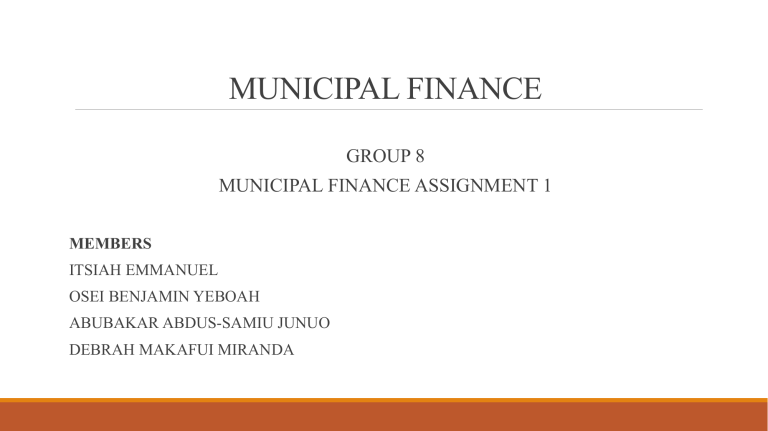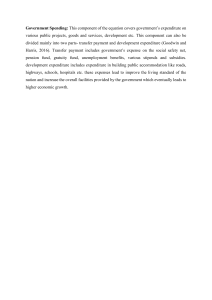
MUNICIPAL FINANCE GROUP 8 MUNICIPAL FINANCE ASSIGNMENT 1 MEMBERS ITSIAH EMMANUEL OSEI BENJAMIN YEBOAH ABUBAKAR ABDUS-SAMIU JUNUO DEBRAH MAKAFUI MIRANDA INTRODUCTION Municipal finance simply talks about the revenue and expenditure decisions of a municipal government. It covers the sources of revenue that are used by municipal government. taxes (income, sales, property, excise taxes), user fees, and intergovernmental transfers. It is made up of ways for financing infrastructure by the usage of operating revenues, borrowing, charges on developers and public-private partnerships. Issues about expenditures at the local level, accounting for expenditure and the revenue decisions, including the budgetary process and financial management. SECTIONS OF THE ACT 936 THAT GIVES RESPONSIBILITY AND POWER TO MMDAS TO COLLECT AND SPENT REVENUE. Section 124 of the Act 936. Revenue of District Assemblies. Subsection 1. The revenues of the District Assembly comprise of; The decentralized transfers. Internally generated funds. Donations and grants Subsection 2. The decentralized transfers comprise funds from the following revenue sources; The District Assembly Common Fund. Grant-in-aid and any other revenue transferred from the central government. Subsection 3. Internally generated fund comprises of funds from the following sources; Licenses Investment income Fees and miscellaneous charges Rates Taxes Subsection 4. A District Assembly shall open and maintain a bank account for revenues and other moneys raised or received by it. Subsection 5. A District Assembly may borrow to finance projects in accordance with relevant laws. Section 125. Establishment of the District Assembly Common Fund. The District Assemblies Common Fund consists of money allocated by parliament and any interests and dividends that accrue from the investments of moneys from the Common Fund. Section 126. Parliament shall annually allocate no less than 5% of the total revenue of the country to the District Assemblies for development. Subsection 137. Charges for license A District Assembly may charge fees for a license issued by or on behalf of the District Assembly, Subject to guidelines in respect of the charging of fees for license as may be prescribed by the Minister. Subsection 138. Licensing of vehicles The owner or a person in possession of a vehicle of a type mentioned in the Ninth Schedule use within a district shall obtain a license for the vehicle from the District Assembly and pay the fee required by the by-law. Section 138. Entertainment licenses. A person shall not undertake or do any of the acts or things specified in the tenth schedule within a district unless the person has obtained a license from the District Assembly for that purpose and paid the fees specified in the by-law. Section 141. Power to charge fees. A District Assembly may charge fees for any services or facilities provided by that District Assembly or for any permit issued by or on behalf of the District Assembly subject to guidelines on fee charging prescribed by the Minister. Section 142. Taxes and other revenues A District Assembly shall collect the taxes chargeable on the income of the income earners listed in the twelfth schedule. The Minister in consultation with the Minister responsible for finance and subject to the term and conditions agreed upon with and appropriate public body, authorize that the public body collect taxes imposed on the income earners on behalf of the District Assembly. Section 143. Investment income. The District Assembly in consultation with the Minister responsible for finance invest any portion of moneys of the District Assembly in safe security other than government treasury bills. Income from this investment shall constitute part of the revenue of the Assembly. Section 144. Rating authority. The District Assembly shall be the only authority to levy rates for a district despite any customary law to the contrary. Section 145. Duty to levy sufficient rates. The District Assembly shall levy sufficient rates to provide for the total estimated expenditure to be incurred by the District Assembly during the period in respect of what the rate is levied. The District Assembly may levy rates for an additional amount required to cover expenditure previously incurred by the District Assembly to meet contingencies or to defray any expenditure which needs to be defrayed. The additional rates may be made and levied before the date on which payment is received in respect of the immediate rates. Section 92. Development charges Subsection 1. A District Planning Authority may levy a development charge in respect of a permit to carry a physical development. Development charges shall be utilized for the provision of infrastructure and services. Development charges shall rate by, payable to and collected by the District Planning Authority to the exclusion of any other body, except in the case of land estate where other specific bodies take responsibility to provide infrastructure and services. QUESTION 2: RELATE THIS TO CURRENT OR EXISTING SITUATION IN ANY MMDA OF YOUR CHOICES. From the Act it can be seen that the constitution gives the mandate of district assemblies to spend and collect revenue but the problem facing the current district assemblies is poor revenue mobilization. Below is a brief finding on spending in the 2020 composite budget for Ablekuma Central The Internally Generated Funds (IGF) for Ablekuma Central had a budget of 4,879,752.79 cedis but in reality, was able to make 1,229,462.56 representing less than a quarter of the expected funds. Investments and miscellaneous did not generate anything for the Municipality. Painting a picture of low generation of revenue which in turn has drastic consequences on the municipality i.e. slow pace of government developmental works. SOURCE; 2020 COMPOSITE BUDGET FOR ABLEKUMA CENTRAL Also, low revenue performances are as a result of inadequate transfer of funds from central government. As evident, the table or budget was as a result of the identified responsibility and power to MMDAs to collect and spend revenue against their roles and responsibility towards the citizens WHAT ARE THE LEGAL FRAMEWORKS FOR MUNICIPAL FINANCE IN GHANA AS LEARNT IN THE ACT 936? Legal framework simply means a set of laws, rules and regulations that apply in a specific country. The legal framework to be review is based in the municipal finance in Ghana, therefore, the legal framework for municipal finance in LGA Act 936, 2016 talks about the district budget submission of the budget estimates the revenue of the district assembly and the district assembly common fund. District Budgets Section 122 The budget for a District Assembly shall comprise the aggregate revenue and expenditure of the Office of the District Assembly, the Departments of the District Assembly; and the budget for the annual development plans and program of the Departments of the District Assembly. Submission of budget estimates Section 123 Each District Assembly is responsible for the preparation, administration and control of the budgetary allocation of the Office of the District Assembly and the Departments of the District Assembly. Each District Assembly shall before the end of each financial year, submit to the Regional Coordinating Councils, the detailed budget for the respective district that states the estimated revenue and expenditure of the District Assembly for the ensuing year. The Regional Co-ordinating Council shall collate and coordinate the budgets for the districts in the region and shall submit same to the Minister responsible for Finance Revenue of District Assemblies Section 124 1. The revenues of a District Assembly comprise donations and grants. decentralized transfers; internally generated funds 2. Decentralized transfers comprise funds from the following revenue sources: a. the District Assemblies Common Fund; b. grants-in-aid from the central government; and c. any other revenue transferred from the central Government to the District Assembly. 3. Internally generated funds comprise funds from the following sources: taxes, investment income and rates licenses, fees and miscellaneous charges, 4. A District Assembly shall open and maintain a bank account for revenues and other moneys raised or received by it. A District Assembly may borrow to finance projects in accordance with relevant laws. For the purposes of this section “grants” means donations being funds paid directly to HOW DOES THIS COMPARE WITH OTHERS IN AFRICA In Nigeria, there are three tiers of government guaranteed by the 1999 constitution, namely; the federal, states and the local governments. These levels or tiers of government are existing in order to help develop the economy of Nigeria. For the purpose of realizing the objectives of the government, they make every effort to provide the basic needs of the people within their geographical area. Danjuma (1994) realized that the ancient Nigerian history showed the setting-up of six adhoc Revenue Allocation Commissions, they are Philipson Commission (1946), The Hicks-Philipson Commission (1951), The Chicks Commission (1953), The Raisman Commission (1958), The Binns Commission (1964) and The Dina Commission (1969). Later efforts including Allocation of Revenue Act (1981) and that of the Allocation of Revenue Amendment Act (1984). These efforts continued to increase the revenue accruable to the Federal Government at the expense of state and local governments. Therefore, internally generated revenue and stabilization funds are significant in the funding of the total expenditure of states in Nigeria at both 5% and 1% levels of significance, loans and grants are insignificant THE GOOD AND BAD SIDES OF OUR SYSTEMS IN WHEN COMPARED WITH THE OTHERS? Since the central government has allocated at least 5% of the nation's revenue to local government in the United States, our system is far better on the local government's side than it is in Nigeria. The drawback of our system is that, in contrast to Nigeria, where funds are distributed from the federal to the state governments, the regional coordination council depends on the district assemblies for income mobilization. It is clear from the study that local governments in Africa rely more on grants and internal money than they do on external funding, notably Central Government funding for their expenditure profile. These put them in risk and hinder their efforts to achieve the much-desired political sovereignty.


